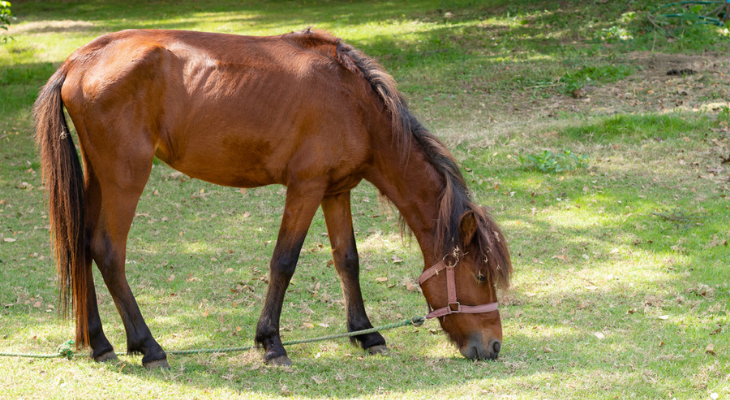
Identifying and Treating PPID
Pituitary pars intermedia dysfunction (PPID), also called equine Cushing's disease, affects hormones that control many bodily functions. The disorder typically affects older horses, although younger horses can develop PPID too.
What is PPID?
PPID occurs when the pituitary gland becomes enlarged or tumors form in the gland. The pituitary gland is located at the base of the brain and produces hormones that help control blood sugar, blood pressure, metabolism, growth, reproduction, and other essential functions.
As the gland becomes bigger, it begins to release more hormones than usual. The increase in hormone production disrupts the body's natural balance and can lead to several health problems. The disorder is usually diagnosed in horses 15 and older, according to UC Davis Veterinary Medicine.
What Types of Health Problems Do Horses with PPID Develop?
Overproduction of hormones can affect every part of your horse's body. High levels of the adrenocorticotropic hormone (ACTH) alter the amount of cortisol in your horse's body. Commonly called the "stress" hormone, cortisol also balances blood sugar and energy, keeps the muscles strong, and helps your horse fight infections.
Horses that have PPID are more likely to develop:
- Muscle Wasting. You may notice that the top of your horse's body begins to look less muscular as a result of PPID.
- Shedding Delays. As spring approaches, your horse may not shed its winter coat. Some horses may grow long, curly hair all over their bodies, while others may only have a few long hairs.
- Weight Loss. Horses with PPID lose weight as their bodies struggle to balance their energy needs.
- Frequent Illnesses. PPID makes it much more difficult to fight off infections. Your horse may seem to develop one illness after another. According to Michigan State University, dental problems, skin infections, parasites, and sinus infections are more likely to affect horses with PPID.
- Insulin Resistance. The disorder also affects the way your horse's body uses insulin, a hormone that makes it possible for the cells to absorb glucose (sugar) in the bloodstream. Insulin resistance prevents glucose from moving from the blood to the cells normally, which causes the blood sugar level to rise. Horses that develop insulin resistance may urinate and drink more than usual. You may also notice fat deposits around the eyes, shoulders, neck crest, or the base of the tail. About 30 percent of horses with PPID develop insulin resistance, according to UC Davis.
- Laminitis. Insulin resistance increases the risk of laminitis, a condition that could cripple your horse. Decreased blood flow to the hoof loosens the connection between the coffin bone and the hoof wall, causing pain and lameness.
- Other Issues and Symptoms. A horse with PPID may develop a rounded abdomen, excessive sweating, fatigue, and changes in behavior.
How Is PPID Treated?
Although there is no cure for PPID, you can do a few things to improve your horse's health and comfort. Pergolide mesylate tablets prescribed by your equine veterinarian can ease some of the symptoms of PPID. The tablets must be given daily for the rest of your horse's life.
Your equine vet may recommend dietary changes that will help your horse stay healthier. You'll also need to watch for signs of parasites, tooth problems, skin infections, and illness, and let your vet know if you spot any troubling signs.
Have you noticed any potential signs and symptoms of PPID in your older horse? Give our office a call, and we'll schedule an appointment to check out your horse.
Sources:
UC Davis Veterinary Medicine: Pituitary Pars Intermedia Dysfunction (PPID), 3/23/20
Veterinary Advantage: The Early Warning Signs of Equine PPID, 6/17
